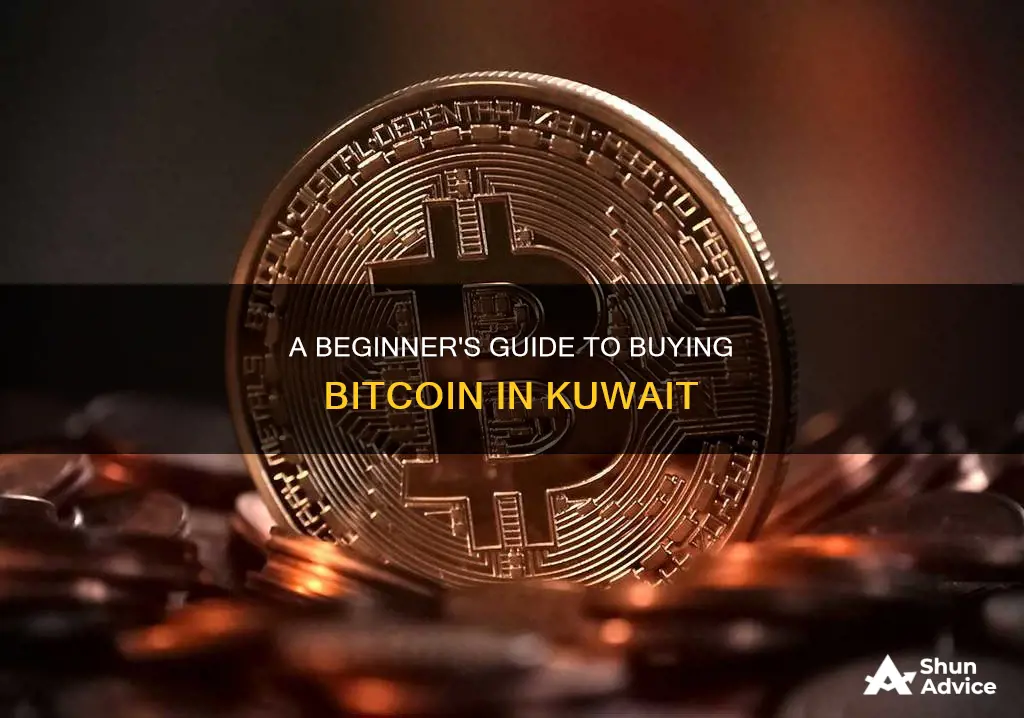
Kuwait has a growing bitcoin community and is a popular place for people to buy and sell bitcoin. However, the Kuwaiti government has banned financial institutions from trading bitcoin, and it is not considered legal tender in the country. The country's financial regulator has also warned the public that companies are not allowed to provide any type of crypto-related services. Despite this, Bitcoin is legal for residents of the country, and citizens can buy and sell cryptocurrency without restrictions from supported exchanges.
There are several trusted online cryptocurrency exchanges operating in Kuwait, including Rain, Binance, and Kraken. These exchanges allow users to buy, sell, and trade cryptocurrencies, each with its own unique features, fees, and payment methods. It is important to do your own research and choose an exchange that suits your needs and preferences.
When investing in Bitcoin in Kuwait, it is essential to have a way to pay, such as a bank account or card payment, and a copy of your photo ID for verification purposes. It is also recommended to use a secure crypto wallet to store your Bitcoin, such as a hardware wallet like the Ledger Nano X or Trezor T, to protect your investment from theft.
What You'll Learn

Choosing a crypto exchange
When choosing a crypto exchange to buy Bitcoin in Kuwait, there are several factors to consider. Here are some key points to help you make an informed decision:
Reputation and Security
Select an exchange with a solid reputation for security and safety. Look for platforms that utilise bank-grade security, encryption, and two-factor authentication. Ensure your chosen exchange meets all CCSS requirements and is regulated by relevant financial authorities.
Fees and Payment Methods
Crypto exchanges charge various fees, including trading fees, deposit and withdrawal fees, and potential account inactivity fees. Compare the fee structures of different exchanges to find the most cost-effective option for your needs. Also, consider the payment methods accepted by the exchange, such as bank transfers, credit or debit cards, and e-wallets like PayPal.
Number of Cryptocurrencies Available
If you plan to trade multiple cryptocurrencies beyond Bitcoin, choose an exchange that offers a wide range of coins and tokens. Some platforms list only the major cryptocurrencies, while others provide a more extensive selection of altcoins.
User Experience and Features
Consider the user-friendliness of the exchange's platform, including its interface, educational resources, and available trading tools. Evaluate whether the exchange suits your trading style, such as mobile trading or access to advanced analysis tools. Additionally, check the account verification process to ensure it aligns with your preferences and requirements.
Customer Service
Assess the exchange's customer support channels and responsiveness. Look for platforms that offer multiple support options, such as live chat, email, and comprehensive help centres. Also, consider the availability of third-party reviews and user feedback to gauge the overall customer satisfaction with the exchange.
Regulation and Fund Storage
Determine whether the exchange is regulated in Kuwait or internationally by reputable financial bodies. Regulation provides an extra layer of protection for your funds. Additionally, choose an exchange that prioritises the safe storage of customer funds, preferably in segregated accounts and cold storage (offline).
Popular Crypto Exchanges in Kuwait
Some popular crypto exchanges in Kuwait include Rain, Binance, Kraken, eToro, Plus500, KuCoin, and Bybit. Compare these exchanges based on the factors mentioned above to make an informed decision. Remember to review their fee structures, security measures, available cryptocurrencies, and user experiences before selecting the one that best suits your needs.
Peter Jones' Bitcoin Loophole: A Smart Investment?
You may want to see also

Payment methods
There are several payment methods available to buy Bitcoin in Kuwait. The most common way is to sign up for a Kuwait-based crypto exchange and deposit money via a bank account or credit card.
Some of the payment methods provided by popular exchanges Rain and Binance are: SWIFT, FAWRI, FAWRI+, Debit Card, Credit Card, MADA, KNET, and BENEFIT.
Other payment methods accepted by various exchanges include:
- Bank Transfer
- Wire Transfer
- E-Wallet (PayPal, Skrill, or Neteller)
- Bank Card
- China Union Pay
- Giropay
- Yandex
- SEPA
- ACH
- Faster Payments
- Cash
- Skrill
- Neteller
- Ethereum
- MADA
- KNET
- BENEFIT
It is important to note that not all exchanges accept all payment methods, so it is recommended to check with the specific exchange before signing up.
Additionally, some banks in Kuwait may restrict spending on crypto purchases or deposits to crypto exchanges. Therefore, it is advisable to verify with your bank beforehand to ensure a smooth transaction process.
Borrowing to Buy Bitcoin: Getting a Loan to Invest
You may want to see also

Crypto wallets
Hot Wallets
Hot wallets are digital tools whose connection to the internet cannot be severed. They are more convenient and easier to recover access to if you lose the private key. However, they are less secure than cold wallets and vulnerable to a wider variety of attacks. Examples of hot wallets include:
- Coinbase Wallet—backed by a reputable trading platform, with a user-friendly interface, and supports more than 100,000 digital assets.
- MetaMask—best for Ethereum; intuitive interface, can be linked to NFT marketplaces, and supports thousands of dApps.
- Trust Wallet—best for mobile; supports a vast range of coins and tokens, simple and easy-to-use interface, and built-in Web3 browser.
- Electrum—best desktop Bitcoin wallet; extensive security features, highly customizable, and fast and easy to set up.
- BlueWallet—best mobile Bitcoin wallet; modern design, supports on-chain and lightning transactions, multi-signature vaults, and integration with the Lightning Network.
- Exodus—best for desktop; native support for over 270 crypto assets, compatible with Trezor hardware wallets, allows users to buy Bitcoin with Apple Pay, and 24/7 customer support.
- Crypto.com—best DeFi wallet; variety of decentralized finance tools, excellent onboarding process, and strong security framework.
Cold Wallets
Cold wallets store your digital keys offline, either on a piece of hardware or a sheet of paper. They are more secure than hot wallets due to offline storage. However, transactions take longer on average, and it is nearly impossible to recover currencies without a backup of your digital keys. Examples of cold wallets include:
- KeepKey—best cold wallet for beginners; reasonably priced, supports over 7,000 cryptocurrencies, easy-to-read digital display, and compatible with popular dApps.
- Ledger Nano S Plus—best hardware crypto wallet; supports a large number of assets, tight security framework, and trading capabilities through the integrated Ledger Live app.
- SafePal—best hybrid crypto wallet; smooth integration between software and hardware solutions, supports over 10,000 cryptocurrencies, and Web3-enabled.
Liquid Chap's Bitcoin Investment: Worth the Risk?
You may want to see also

The legality of Bitcoin in Kuwait
Kuwait's Ministry of Finance has stated that it does not recognise Bitcoin as a legitimate currency, and financial institutions are prohibited from trading in cryptocurrencies. The Central Bank of Kuwait (CBK) also released a statement in January 2018, clarifying that it prohibits the banking sector and companies under its control from engaging in cryptocurrency trading. This includes the acceptance of cryptocurrency in e-payment transactions and the mediation between parties involved in cryptocurrency transactions.
However, the sources from the Ministry of Finance added that neither the Ministry nor the Central Bank can regulate Bitcoin trading more generally, as they do not recognise it as a currency. This lack of recognition means that Bitcoin trading falls outside the direct control of the Kuwaiti authorities, as it is primarily managed through the internet.
Additionally, while Kuwaiti citizens are reportedly at the forefront of Bitcoin trading, the proceeds of Bitcoin wired from abroad to Kuwait are considered illegal and unclean money under Kuwaiti law, as it does not recognise these currencies.
Despite the lack of official recognition and the restrictions on financial institutions, there are still ways for individuals in Kuwait to invest in Bitcoin. Several online cryptocurrency exchanges, such as Rain, Binance, and Kraken, are accessible to Kuwaiti users and allow them to buy, sell, and store cryptocurrencies. These exchanges provide a degree of security and convenience for those looking to invest in Bitcoin.
It is worth noting that the regulatory landscape surrounding cryptocurrencies is constantly evolving, and individuals in Kuwait should stay updated with the latest developments to ensure they comply with any new laws or regulations.
Dogecoin: Long-Term Investment or Just a Meme?
You may want to see also

Mining Bitcoin in Kuwait
Kuwait is the most affordable country in the world for mining Bitcoin. The total electrical cost of mining a single Bitcoin in the emirate is $1,394, compared to the global average of $35,404.03. This is due to Kuwait's low cost of living, which makes amenities such as electricity relatively inexpensive.
The affordability of mining Bitcoin in Kuwait is further enhanced by the country's abundant oil and gas reserves, which the government heavily subsidizes. As a result, crypto miners have been attracted to Kuwait and other countries in the Middle East, Central Asia, and North America, where electricity costs are low.
However, it is important to consider the environmental impact of crypto mining, as the energy-intensive process contributes to carbon emissions and rising temperatures in Kuwait.
While the Kuwaiti government has not banned cryptocurrency mining, it is important to note that the Central Bank of Kuwait does not recognize cryptocurrency as legal tender. The bank has banned commercial banks and financial institutions in Kuwait from processing transactions in Bitcoin since 2017 and has issued warnings to citizens about the risks of investing in cryptocurrency.
Despite these warnings, individuals in Kuwait are free to mine, invest in, and sell Bitcoin and other cryptocurrencies through centralized exchanges. Additionally, there is no taxation on income generated by individuals from cryptocurrency trading in Kuwait, making it a profitable yet risky investment.
A Beginner's Guide: Investing in Bitcoin in Bahrain
You may want to see also
Frequently asked questions
Yes, it is legal for residents of Kuwait to buy and sell Bitcoin. However, there are some restrictions on how you can do so. The Kuwaiti government has banned financial institutions from trading Bitcoin, and it is not recognised as legal tender in the country.
You will need a crypto exchange account, a way to pay (such as a bank account or card), a copy of your photo ID, and a personal crypto wallet (optional).
Some of the trusted exchanges in Kuwait are Rain, Binance, Kraken, eToro, BitOasis, Coinbase, and CEX.IO.
MetaMask and Trust Wallet are considered two of the best crypto wallets available in Kuwait.
Yes, as long as you use a safe and secure crypto trading platform and store your Bitcoin in a hardware wallet like the Ledger Nano X or Trezor T.







